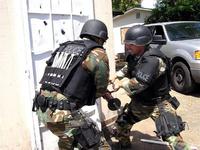-
Detecting bioterror attacks
About 80 percent of the U.S. population lives in the thirty largest cities in the United States; the government has deployed a secret system of biosensors to detect bioterror attacks; the location of the sensors, and the pathogens they search for, are kept secret so terrorists would not be able to tamper with the sensors or evade them (officially, even the list of cities where the system is deployed is kept secret)
-
-
San Jose halts gang violence, ends ICE partnership

Two months after it began its alliance with immigration officials to crack down on gang violence, the San Jose Police Department in California announced that it was ending its partnership with the U.S. Immigration and Customs Enforcement (ICE) agency; on 24 June, two ICE agents stepped in to help San Jose which was struggling to contain its highest murder rate in twenty years
-
-
U.S. makes nuclear fuel available to other countries
The United States announced the availability of a reserve stockpile of low-enriched uranium (LEU) for use in nuclear fuel; the LEU is derived from down-blended surplus military material; the LEU will be made available to countries interested in nuclear power generation, thus making it unnecessary for these countries to develop their own uranium-enrichment technology
-
-
North Dakota receives $10 million for border security
To help secure the U.S.— Canada border, North Dakota will receive more than $9.6 million in DHS grants; the funds are aimed at helping local law enforcement agencies prevent a terrorist attack, secure the border, and bolster emergency preparedness
-
-
Obama administration seeks hold on tough Alabama immigration law
The Obama administration has requested a federal judge to temporarily block a tough new immigration law set to take effect in Alabama on 1 September
-
-
Poor oversight, cost overruns plague Coast Guard’s modernization efforts

More than $7 billion and ten years later, the U.S. Coast Guard has only built two ships out of its original twenty-five year, $24.2 billion plan to replace its aging fleet with more than 250 new or upgraded vessels; given the service’s procurement track record, Congress is hesitant to continue funding a program plagued by cost overruns, delays, and management problems
-
-
Chinese TV shows cyber-attack software
A Chinese government TV station, perhaps inadvertently, shows a government cyberattack aimed at Falun Gong computers; the video identifies the software as being written by the Electrical Engineering University of the People’s Liberation Army; the video — which has been removed from the TV station’s Web site — provides direct evidence of Chinese government involvement in cyberattacks
-
-
DHS awards $19 million to nonprofits for security
On Tuesday DHS announced that it had awarded nearly $19 million to nonprofit organizations around the country that are considered to be at high risk of terrorist attack.
-
-
Mitigating mail-borne threats
Mark V. Michel, the U.S and Canada business development manager of PowderSafe, a firm which specializes in developing mail processing security systems, recently spoke with Homeland Security NewsWire’s executive editor Eugene K. Chow; in the interview, Michel discusses the continued threats from mail-born substances, why even a hoax letter can still be damaging, and methods to mitigate the threat
-
-
Detroit police to stop responding to unverified burglar alarms
As of Monday, 22 August, the Detroit police department will no longer respond to burglar alarms unless security companies can verify the need for an officer; the policy is aimed at reducing the number of false alarms and allowing officers more time to focus on critical duties; more than 98 percent of all burglar alarms are false alarms; critics of the new policy fear that it will exacerbate safety conditions in a city already plagued by crime and slow police response times
-
-
Mexican trucks cited for 1 million violations since 2007

Trucks transport roughly $275 billion worth of goods — or 70 percent of the total — that pass between the United States and Mexico annually; the trucks from Mexico, however, often fail to meet U.S. safety standards
-
-
"Cop shops" in Texas help fight apartment crime
Residents in Texas apartment complexes have begun dedicating entire units to police officers so they have a place to rest, take a break, and fill out reports; the cop shops help minimize crime by keeping officers in parts of town where their presence is needed
-
-
Cyber experts dispute McAfee's Shady RAT report

Earlier this month, cybersecurity experts discovered a five-year operation that infiltrated U.S. government and UN computer networks; China is believed to be the culprit behind the systematic attacks, dubbed “Operation Shady RAT,” which also hit major defense contractors and private businesses; many within the cybersecurity community are disputing the significance of the finding
-
-
U.S. agencies are still struggling with information sharing
It is nearly ten years since the 9/11 terrorist attacks, and U.S. intelligence agencies are still struggling to strengthen the information sharing networks that proved broken that September day; according to the latest CRS report, “there remain many institutional and procedural issues that complicate cooperation between the two sets of agencies”
-
-
Prez security dome over Martha's Vineyard
On a typical summer day, about 700 small private planes land on Martha’s Vineyard, bringing rich vacationers — mostly from New York City — to what locals call The Rock; not while the president is on the island vacationing, though: The FAA Temporary Flight Restriction is in place over the island for the duration of the president’s vacation
-
More headlines
The long view
Factories First: Winning the Drone War Before It Starts
Wars are won by factories before they are won on the battlefield,Martin C. Feldmann writes, noting that the United States lacks the manufacturing depth for the coming drone age. Rectifying this situation “will take far more than procurement tweaks,” Feldmann writes. “It demands a national-level, wartime-scale industrial mobilization.”
No Nation Is an Island: The Dangers of Modern U.S. Isolationism
The resurgence of isolationist sentiment in American politics is understandable but misguided. While the desire to refocus on domestic renewal is justified, retreating from the world will not bring the security, prosperity, or sovereignty that its proponents promise. On the contrary, it invites instability, diminishes U.S. influence, and erodes the democratic order the U.S. helped forge.
Fragmented by Design: USAID’s Dismantling and the Future of American Foreign Aid
The Trump administration launched an aggressive restructuring of U.S. foreign aid, effectively dismantling the United States Agency for International Development (USAID). The humanitarian and geopolitical fallout of the demise of USAID includes shuttered clinics, destroyed food aid, and China’s growing influence in the global south. This new era of American soft power will determine how, and whether, the U.S. continues to lead in global development.
Water Wars: A Historic Agreement Between Mexico and US Is Ramping Up Border Tension
As climate change drives rising temperatures and changes in rainfall, Mexico and the US are in the middle of a conflict over water, putting an additional strain on their relationship. Partly due to constant droughts, Mexico has struggled to maintain its water deliveries for much of the last 25 years, deliveries to which it is obligated by a 1944 water-sharing agreement between the two countries.
How Disastrous Was the Trump-Putin Meeting?
In Alaska, Trump got played by Putin. Therefore, Steven Pifer writes, the European leaders and Zelensky have to “diplomatically offer suggestions to walk Trump back from a position that he does not appear to understand would be bad for Ukraine, bad for Europe, and bad for American interests. And they have to do so without setting off an explosion that could disrupt U.S.-Ukrainian and U.S.-European relations—all to the delight of Putin and the Kremlin.”
How Male Grievance Fuels Radicalization and Extremist Violence
Social extremism is evolving in reach and form. While traditional racial supremacy ideologies remain, contemporary movements are now often fueled by something more personal and emotionally resonant: male grievance.
